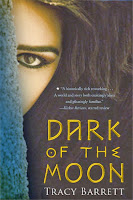Staying Relevant . . . to Bronze-Age Teens?
by Tracy Barrett
You might think that writers of historical fiction don’t
have to worry about relevance. Not so! We do, however, have a different set of problems in this area than do authors of contemporary fiction.
Unlike writers of contemporary fiction, we have the luxury of not worrying about whether our use of
slang will be dated by the time the book is out. But we still have to be
concerned that perfectly normal (for its day) slang used by our characters will sound weird to our readers, removing them from the world we’ve so carefully constructed.
 |
| Bronze Age |
 |
| Iron Age |
 |
| Medieval |
Actually, by removing the reader from
the world she’s familiar with (removal
to a different era, a different place, a fantasy world, a science-fiction
setting), the relevance of the story to the reader’s life can actually be enhanced. Since the trappings of daily life in our created world are different from what the reader knows, they become less relevant, and the universals stand out.
It’s a cliché that people are the same everywhere. That
might be true (some clichés are, after all!), but all societies aren’t all the same. Expectations,
customs, habits, beliefs—humans have come up with endless varieties.
*For example, if you say that in 1492, people had known for 2,000 years that the world was round, and that they even had a very good idea of its size, some readers will dredge up elementary-school memories of Christopher Columbus and think you don’t know what you’re talking about.
Yes to all of this, Tracy! People thinking things about the past that just aren't true is the WORST. Ugh, stupid Columbus!
ReplyDeleteI once had a fellow panelist tell me right before our panel that my MC couldn't have had a rifle in her context. I was right, and I knew I was right, because I had done the research over and over, but it still rattled me so much that I went and checked again afterward. And guess what? I was right!
I know! I start doubting myself too. I had a Greek woman tell me that I'd gotten some elements of Greek Orthodox religion wrong in ANNA OF BYZANTIUM and I had to tell her (gently) that the way the religion is practiced today isn't identical to how it was practiced a millennium ago. It worked out, though--by the end of the email conversation she had invited me to her family's Greek island!
DeleteAnd sometimes people get upset because you haven't sanitized things. I've sat in on panels at mystery conferences where the topic was historical research and some of it was pretty grim stuff-stuff that sensitive critics, etc. do not want to acknowledge. Good post and thank you for doing it.
ReplyDeleteI had that issue with a nonfiction book on the Trail of Tears. Apparently the editor thought I was too hard on poor old genocidal Andrew Jackson . . .
DeleteLOVE that point about people being true but societies being different.
ReplyDeleteI admire anyone who writes historical fiction. It comes with a unique set of challenges. Great post.
ReplyDelete